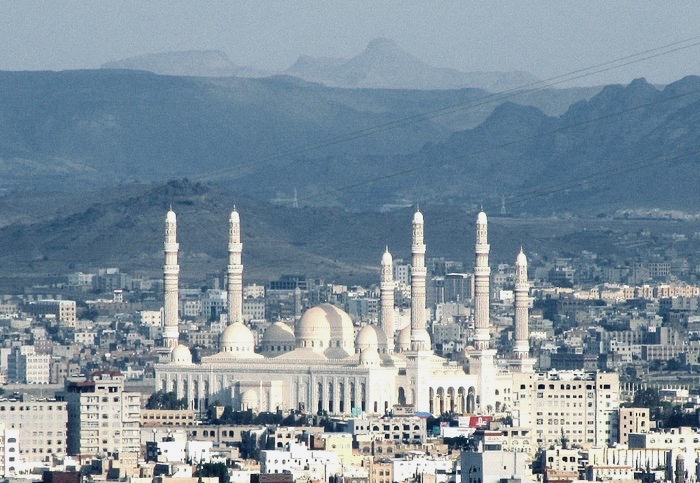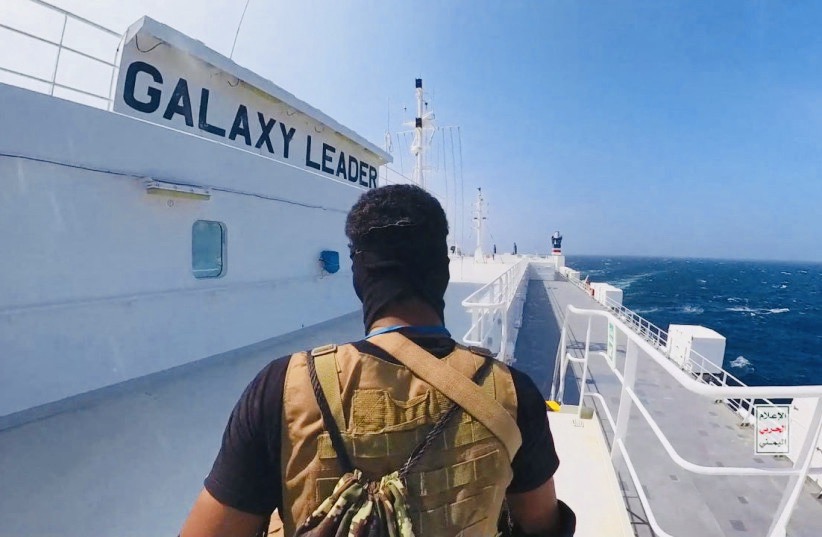As if Israel had no shortage of enemies, a new one has menacingly emerged since the outbreak of Israel’s war with Hamas last month.
The Houthis, a Zaydi Shi’a sect in Yemen backed financially and militarily by Iran, Israel’s deadliest foe, have declared war on Israel in a bold gesture of solidarity with Hamas and the Palestinians.
Since last month, Houthis have fired ballistic missiles at the Israeli port of Eilat, seized an Israeli-owned vessel in the Red Sea, and attacked another Israeli ship in the Indian Ocean.

Ali Al-Qahhoum, a member of the Houthi’s political bureau, has warned that the Houthis will continue to target Israel until its “demise.”As he said recently, “We will not stand idly by in the face of Zionist aggression against the Palestinian people.”
Having acquired an arsenal of drones and ballistic missiles from Iran, the Houthis pose a potential strategic threat to shipping lanes in the Middle East and to Eilat, Israel’s gateway to the Red Sea.
They also continue to threaten Arab oil refineries in Saudi Arabia and the United Arab Emirates, which already have been attacked by the Houthis.
As members of the so-called Axis of Resistance, the Houthis are allied with Iran, along with like-minded Iranian proxies in Syria, Iraq and Lebanon. Its leader, Abdul Malik al-Houthi, is the brother of Hussein al-Houthi, who was killed in 2004.

Yemen, one of the most dysfunctional countries in the Arab world, was thrown into civil war after the Houthis captured Sanaa in 2014, forcing the internationally-recognized government to flee south and then into exile in Saudi Arabia. In the following year, the Saudis intervened on the side of the southerners in what has been an inconclusive war.

Today, Sanaa is in the hands of the Houthis and the Iranian-backed Government of National Salvation, which controls northern Yemen. Its rival, ensconced in the southern port of Aden and supported by Saudi Arabia and the United States, claim to be Yemen’s sole legitimate ruler.
An xenophobic sect, the Houthis have been accused of harassing the few remaining Jews of Yemen, the vast majority of whom immigrated to Israel in the early 1950s. Houthi officials deny they have persecuted Jews. “Our problems are with Zionism and the occupation of Palestine, but Jews here have nothing to fear,” Houthi spokesman Fadl Abu Taleb said several years ago.

According to the Israeli Druze politician Ayoob Kara, Houthi radicals gave Jews an ultimatum to convert to Islam or leave Yemen. Nearly every Jew has since emigrated.
Always intrinsically anti-Israel, the Houthis waited more than three weeks after the October 7 massacre in southern Israel to show solidarity with Hamas. On October 31, from a distance of about 2,000 kilometers, they fired a surface-to-surface missile at Eilat. Israel’s Arrow 2 air defence system intercepted it. On November 9, they launched another ballistic missile at Eilat, but it was downed by Israel.

In the wake of these incidents, the Israeli Navy deployed additional missile boats in the Gulf of Aqaba and the adjoining Red Sea.
On October 19, the USS Carney, operating near the coast of Yemen, shot down three missiles and several drones aimed at Israel by Houthi forces.
Since October 17, dozens of U.S. troops have been wounded in more than 70 missile attacks launched by Iranian proxies at American installations in Iraq and Syria. In response, the United States has struck their bases in Syria and Iraq.
On November 8, the Houthis downed a U.S. drone near Yemen.
Earlier this month, on November 19 to be precise, they hijacked the M/V Galaxy Leader, a Bahamian-flagged ship partially owned by the Israeli tycoon Abraham Ungar, in the Red Sea. Carrying a cargo of vehicles, it was en route from Egypt to India.

After eight armed terrorists seized the vessel, which was manned mostly by a crew of 25 Ukrainian, Bulgarian, Mexican and Filipino sailors, the Houthis circulated a four-minute video showing a helicopter, emblazoned with the flags of Yemen and the Palestine Liberation Organization, landing on its deck.

Six days later, on November 25, the CMA CGM Symi, a Malta-flagged container ship owned by the Israeli billionaire Idan Ofer but registered in Singapore, was attacked by a suspected Iranian drone in the Indian Ocean. The drone caused damage to the ship but left the crew unscathed.
On November 28, G7 foreign ministers in Japan demanded the release of the M/V Galaxy Leader.
“Emphasizing the importance of maritime security, we call on all parties not to threaten or interfere with the lawful exercise of navigational rights and freedoms by all vessels,” they said in a statement. “We especially call on the Houthis to immediately cease attacks on civilians and threats to international shipping lanes and commercial vessels and release the M/V Galaxy Leader and its crew, illegally seized from international waters …”
The M/V Galaxy Leader incident prompted Israeli Prime Minister Benjamin Netanyahu’s office to release the following statement, “This is another act of Iranian terrorism and constitutes a leap forward in Iran’s aggression against the citizens of the free world, with international consequences regarding the security of global shipping lanes.”
Israel and Iran have been engaged in a shadow war on the high seas for the past few years. Starting in 2019, Israel began attacking ships carrying Iranian oil and arms to Syria through the eastern Mediterranean Sea and the Red Sea.
Israeli cargo ships, in turn, came under Iranian or Houthi fire. Two years ago, for example, the oil tanker Mercer Street was attacked by Iran off the coast of Oman, resulting in the deaths of two sailors.
On November 26, pirates believed to be Somalis captured the Central Park, a Liberian-flagged tanker linked to Israel, near the coast of Aden. In short order, a U.S. naval force rescued the vessel, which is under the ownership of Eyal Ofer, an Israeli businessman.
More such incidents are expected to take place should the Israel-Hamas war resume following the release of Israeli hostages kidnapped by Hamas and the release of Palestinian prisoners held in Israel jails.
